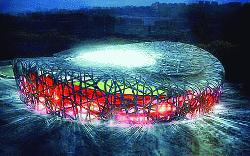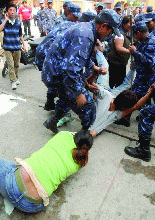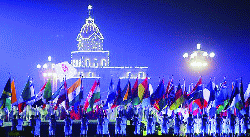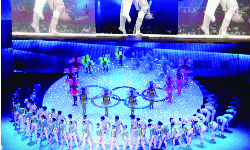Archives
A look at the Beijing Olympics
A look at the Beijing Olympics
It all began in Olympia in Athens in the year 776 B.C. the last of the ancient Olympics was held in the year 393 A.D. The first ever modern Olympics was held in the year 1896 in Athens in which only male athletes were allowed to compete, 245 athletes from 14 different countries participated in the maiden modern Olympics. The Olympic movement has come a long way since its inception. Apart from achievements, the Olympics has had its share of disappointments, countries had always used the games to further their political causes, the protests came to a head in the 1972 Munich Games when eleven athletes were killed by Palestinian terrorists.
The first ever modern Olympics was held in the year 1896 in Athens in which only male athletes were allowed to compete, 245 athletes from 14 different countries participated in the maiden modern Olympics. The Olympic movement has come a long way since its inception. Apart from achievements, the Olympics has had its share of disappointments, countries had always used the games to further their political causes, the protests came to a head in the 1972 Munich Games when eleven athletes were killed by Palestinian terrorists.
The Beijing Games too had its share of problems. Tibetan protestors disrupted the running of the Olympic torch in several places around the world and called for boycott of the games. The massive earthquake in Sichuan province on May 12th claimed thousands of lives, but the Chinese who have been planning this event for the last seven years, when the honour of hosting the Games was awarded to Beijing in 2001, made an all out effort to made the 2008 Beijing Olympics the best ever.
 The Opening Ceremony of the Beijing Olympics was a spectacular ceremony that wove ancient Chinese history with modern wizardry. The games; with an estimated cost of 43 billion dollars is the costliest ever. The Bird’s Nest stadium exploded in a dazzling extravaganza that offered a vision of global harmony echoing the Games’ motto “One World One Dream.” This was the result of hard work and years of planning and preparation.
The Opening Ceremony of the Beijing Olympics was a spectacular ceremony that wove ancient Chinese history with modern wizardry. The games; with an estimated cost of 43 billion dollars is the costliest ever. The Bird’s Nest stadium exploded in a dazzling extravaganza that offered a vision of global harmony echoing the Games’ motto “One World One Dream.” This was the result of hard work and years of planning and preparation.
The 16 day sporting extravaganza finally came to an end in Beijing. The curtains were drawn on a magnificent Olympic Games when London Mayor Boris Johnson was handed the Olympic flag by his Beijing counterpart Guo Jinglong. The British capital will be hosting the 2012 Olympics. At the end of 16 days of intense rivalry among the athletes who strove to better each other, the Beijing Olympics produced two sporting icons; Michael Phelps of the United States and Usain Bolt of Jamaica. Phelps bettered Mark Spitz’s record of seven gold medals in a single Olympic by bagging eight gold medals in these Olympics. Bolt who has been termed as brash and cocky mesmerized the 91,000 strong spectators by winning three gold medals as he set the athletics track on fire.
If the August 8 Olympic Ceremony was a gala affair, the closing ceremony was the fulfillment of the same promise as Beijing had a night to remember. The closing ceremony showcased the rich Chinese heritage and it was skillfully blended with modern technology and a display of fire works that was a visual treat.
India had its richest ever haul of medals, a total of three, one gold and two bronze. Abhinav Bindra made a “historic breakthrough” by winning the first ever individual gold for India. Apart from the one gold, India won its first ever medal in boxing where Vijender Kumar lost in the semi-final and had to be contended with a bronze, the other bronze medal was won by Sushil Kumar in wrestling. He emulated the feat of K.D. Jadhav who also won bronze at the 1952 Olympics in Helsinki. Apart from these achievements there were a few sparks here and there like Akhil Kumar and Jitender Kumar in boxing and Saina Nehwal in Badminton. Apart from these isolated performance we have nothing to show, the question is; why do we fail to perform at the bigger stage? A small country such as Cuba, with a population of just 11.3 million won 24 medals whereas India in spite of having a population of more than one billion won a meager three medals.
It has always remained a mystery as to how the Indian athletes perform well at world class level sports meets before a big event and then disappoint on the all important stage. The hype created back home of our athletes being primed to compete in the Olympics through a systematic training performance, all came to nothing as the Indian athletes come up with one mediocre performance after the other. Our coaching team could not even chalk out proper planning; one has to improve step by step in order to do well in the Olympics. Perhaps our team management forgot the basic fact and allowed the athletes to peak at the wrong time.
and then disappoint on the all important stage. The hype created back home of our athletes being primed to compete in the Olympics through a systematic training performance, all came to nothing as the Indian athletes come up with one mediocre performance after the other. Our coaching team could not even chalk out proper planning; one has to improve step by step in order to do well in the Olympics. Perhaps our team management forgot the basic fact and allowed the athletes to peak at the wrong time.
For Indians sports to reach a level of which we can be proud of there should be a positive change in the management and mindset. Sports nowadays is a specialized job therefore we need people who are experts in the field. We should also do away with regional biases that exist today. Sports should act as a tool which unifies the country and finally we should be sending a smaller delegation of officials to these games and the money thus saved should be utilised to groom talent.
The North East too has no dearth of talented athletes as has been proved by Manipur which has produced many international level athletes. Imphal in Manipur and Guwahati in Assam have been fortunate enough to have international standard sports infrastructure by virtue of their hosting the national games. However, that is not enough. There are other places in the region that have abundance of talent but due to lack of proper training and guidance they remain stagnant. Mr. Meren Paul, General Secretary of the Nagaland S ports Association said that, “In other parts of the North East there are only one or two stadiums and that too not of international standard.” He also says that we should adopt new methods of training if we want to produce international level athletes.
ports Association said that, “In other parts of the North East there are only one or two stadiums and that too not of international standard.” He also says that we should adopt new methods of training if we want to produce international level athletes.
Meghalaya too does not boast of international level sporting facilities but in spite of this handicap certain athletes have been able to make a mark for themselves both in the national and international level and have done the state proud. The General Secretary of the Meghalaya State Olympic Association, Mr. D. Syiemlieh, he said that, “The sports budget of the state is so small it is not enough to even construct one stadium.”
The health of the nation depends upon how active the youths of the nation are. A beginning has to be made, we should get our priorities right soon. No doubt India has potential but this has to be channelised porperly. The people responsible should identify athhletes with potential irrespective of their region, community, caste, religion or any other physical barriers that may exist. Infrastructures should be mad e available to them so that the athletes can upgrade their skills and become medal prospects by the 2010 London Olympics.
